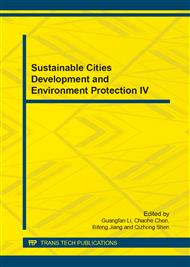p.42
p.48
p.57
p.63
p.70
p.77
p.81
p.86
p.92
Analysis of Landscape Space Meta-Structure in Regional Settlement
Abstract:
The regional settlement has close relationship with the environment of specific terrain, and formed integrated and vivid human settlement landscape system through human’s social living and practice. Taking the analysis view of studying space structure of landscape form, this paper is trying to find out a new study clue for traditional settlement configuration in specific region – the element of landscape space structure - the meta structure as the object, and aim to provide a practical theory and method for regional traditional settlement study.
Info:
Periodical:
Pages:
70-76
Citation:
Online since:
July 2014
Authors:
Keywords:
Price:
Сopyright:
© 2014 Trans Tech Publications Ltd. All Rights Reserved
Share:
Citation:


